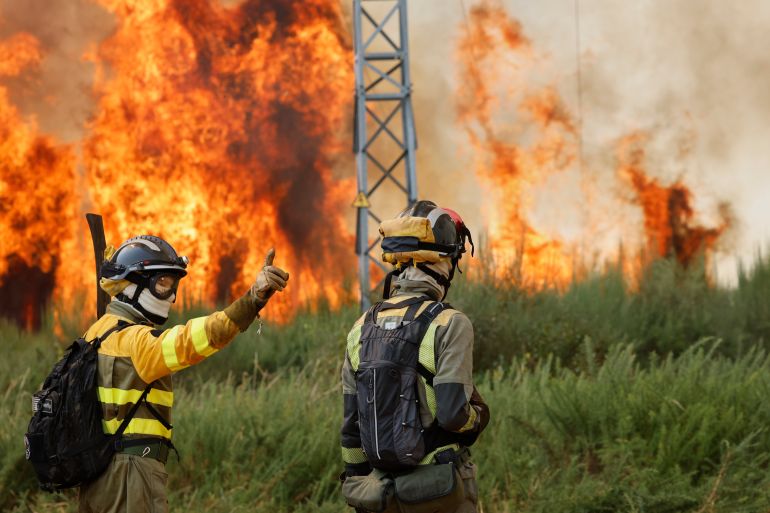Spain battles 20 big wildfires, deploys 500 more soldiers in searing heat
Authorities are awaiting the arrival of two Dutch water-dumping planes, expected to join other EU aircraft.

Published On 17 Aug 202517 Aug 2025
Spain has deployed a further 500 soldiers from the military emergency unit to support firefighting operations as it battles 20 major wildfires across the country during a heatwave that began last week.
“There are still some challenging days ahead, and unfortunately, the weather is not on our side,” Prime Minister Pedro Sanchez said at a news conference on Sunday in Ourense, one of the most affected areas, in northwestern Spain.
Recommended Stories
list of 3 itemsend of list
He announced an increase in military reinforcements, bringing the total number of soldiers deployed across Spain to 1,900.
Firefighters are tackling 12 major wildfires in the northwestern region of Galicia alone, all of them near the city of Ourense, the head of the Galician regional government Alfonso Rueda also said during the news conference.
“Homes are still under threat, so we have lockdowns in place and are carrying out evacuations,” Rueda said.
The announcements came as authorities awaited the arrival of promised aircraft reinforcements from other European countries.
National rail operator Renfe said it suspended Madrid-Galicia high-speed train services scheduled for Sunday due to the fires.
Galician authorities advised people to wear face masks and limit their time spent outdoors to avoid inhaling smoke and ash.
Southern Europe is experiencing one of its worst wildfire seasons in two decades with Spain among the hardest-hit countries.
In the past week alone, fires there have killed three people and burned more than 1,150sq km (445sq miles) while neighbouring Portugal also battles widespread blazes.
Advertisement
Temperatures are expected to reach up to 45 degrees Celsius (113 degrees Fahrenheit) in some areas on Sunday, Spain’s national weather agency, AEMET, said.
Virginia Barcones, director general of emergency services, told Spanish public TV that temperatures were expected to drop from Tuesday, but for now, the weather conditions were “very adverse”.
EU help on its way
“The fireplanes come in from all sides, but they don’t come here,” Basilio Rodriguez, a resident, told the Reuters news agency on Saturday.
Spain was expecting the arrival of two Dutch water-dumping planes that were to join aircraft from France and Italy already helping Spanish authorities under a European cooperation agreement.
Firefighters from other countries are also expected to arrive in the region in the coming days, Barcones told public broadcaster RTVE.
Ministry of Interior data show 27 people have been arrested and 92 were under investigation for suspected arson since June.
In neighbouring Portugal, wildfires have burned about 1,550sq km (600sq miles) of vegetation so far this year, according to provisional data from the Institute for Nature Conservation and Forests – three times the average for this period from 2006 to 2024. About half of that area burned just in the past three days.
Thousands of firefighters were battling eight large blazes in central and northern Portugal, the largest of them near Piodao, a scenic, mountainous area popular with tourists.
Another blaze in Trancoso, farther north, has now been raging for eight days. A smaller fire just east of there killed a local resident on Friday – the first death this season.
Portugal is set for cooler weather in the coming days. A national state of alert due to wildfires was imposed on August 2 and was due to end on Sunday, a day before two Swedish firefighting planes were to arrive.
As in Spain, Portugal’s resources have been stretched. On Sunday, more than 4,000 firefighters and 1,300 vehicles were deployed as well as 17 aircraft, the Civil Protection Agency said.
Wildfires also burning in Turkiye
Greece, Bulgaria, Montenegro and Albania have also requested help from the European Union’s firefighting force in recent days to deal with forest fires. The force has already been activated as many times this year as during all of last year’s summer fire season.
In Turkiye, where recent wildfires have killed 19 people, parts of the historic region that includes memorials to World War I’s Gallipoli campaign were evacuated on Sunday as blazes threatened homes in the country’s northwest.
Advertisement
Six villages were evacuated as a precautionary measure, the governor of Canakkale province, Omer Toraman, said.
About 1,300 firefighting personnel backed by 30 aircraft were battling the blazes, according to the General Directorate of Forestry.
Turkiye has been struck by hundreds of fires since late June, fuelled by record-breaking temperatures, dry conditions and strong winds.
Europe has been warming twice as fast as the global average since the 1980s, according to the EU’s Copernicus Climate Change Service. Scientists said climate change is exacerbating the frequency and intensity of heat and dryness in parts of Europe, making the region more vulnerable to wildfires.
